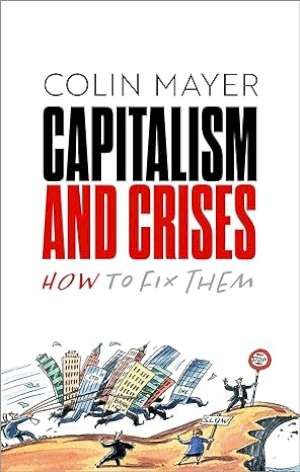21 March 2024
Capitalism and Crises
How to Fix Them
Colin Mayer
2024, Oxford University Press, 336 pages,
ISBN 9780198887942
Reviewer: Dame Kate Barker, USS

This book is the third in Mayer’s trilogy about the wrongs of the economic world we presently live in. A stimulating read, it draws on many years of working with business and has a tone of deep frustration – he believes we can and should do better. It is both pessimistic in listing the number of crises we face, and optimistic in proposing a solution. The pessimism is hard to disagree with, but the optimism requires a transformation of how we do business which is likely to prove beyond our grasp.
The starting proposition is that our capitalist system works only to the benefit of a few, and is responsible for most of the crises we face. Profit is earned not just from solving problems, but also from creating them. As it is hard to compete in this system without resorting to making this unjust profit, so inevitably all firms will tend to behave in the same way. Governments and regulators may seek to limit the harms done by business, but have proved ineffectual.
The past decade has seen government and business adjust in response to crises; the global financial crisis, Covid-19 and, increasingly, climate change. Firms and investors now talk much more about ESG, but the fundamental change needed to prevent these crises from occurring has not been forthcoming.
Mayer argues for a reframing of the Moral Law, and in passing (as others have done) for a re-reading of Adam Smith putting more weight on the Theory of Moral Sentiments. We should adopt: ‘Do unto others as they would have done unto them’. This would mean businesses redirected towards solving problems, and declaring profits only on this basis, discounting what is earned from problem creation. Directors’ duties then extend to ensuring profits do not come from detriment for others. Even enlightened shareholder interests ‘sweep under the carpet what happens if there is an inevitable ‘or’ in choosing between societal and shareholder benefits’.
There are some interesting observations about company ownership. Mayer considers that the increased dispersion of ownership and control, which is especially marked in the UK, has combined with the loss of local banking to produce distant owners and centralised finance. He argues for dominant shareholders to take ownership of the problems the company exists to solve. These are not necessarily family owners (these are found to be wanting), but more likely to be foundations, private equity or sovereign funds. In this regard he favours having owners of large blocks of shares, who are not easily able to sell out.
Mayer’s Enacting Purpose Initiative has advised boards to adopt SCORE; Simplifying purpose, Connecting purpose with strategy, Owning problem-solving, Rewarding according to contribution to purpose and Exemplifying the purpose. Astra Zeneca’s approach to Covid-19, and Handelsbanken’s trust-based, customer-focused approach to banking are both cited favourably.
Much of this sounds idealistic, and it is not clear to me how financial flows would evolve into this new world, how investors would be rewarded, or how those damaged by a company’s activity compensated. However, Mayer suggests we should look harder at Denmark, the home of Novo Nordisk – a clear case of company purpose and largely owned by a foundation. He claims, citing in particular its enterprise foundation law, that Denmark is already on the way towards the desirable transformation.
Mayer is right to point out that the business world is one we have designed. If it is not delivering what we want and need today – it is up to us to move it at least some of the distance toward the important concept of the just profit.
